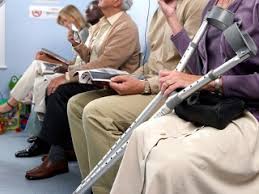February 10th, 2011 by RyanDuBosar in Health Tips, Research
2 Comments »

 Physicians said in a survey that noncompliance with advice or treatment recommendations was their foremost complaint about their patients. Most said it affected their ability to provide optimal care and more 37 percent said it did so “a lot.”
Physicians said in a survey that noncompliance with advice or treatment recommendations was their foremost complaint about their patients. Most said it affected their ability to provide optimal care and more 37 percent said it did so “a lot.”
Three-quarters of patients said they were highly satisfied with their doctors. But they still had complaints ranging from long wait times to ineffective treatments.
Those are just some of the findings from two surveys, the first a poll of 660 primary care physicians conducted by the Consumer Reports National Research Center in September 2010 and the second a poll of 49,000 Consumer Reports subscribers in 2009. The magazine reported its results online.
In the doctors’ poll, physicians named these top challenges:
— 76 percent of doctors said when it came to getting better medical care, forming a long-term relationship with a primary care physician would help “very much.”
— 61 percent said being respectful and courteous toward doctors would help “very much,” while 70 percent said respect and appreciation from patients had gotten “a little” or “much” worse since they had started practicing medicine. This was a two-way street, since patients reported the same feelings.
— 42 percent physicians said health plan rules and regulations interfered “a lot” with the care they provided.
Also noted in the poll, 37 percent of physicians thought they were “very” effective when it comes to minimizing pain and discomfort for their patients, though 97 percent thought they were “somewhat” effective. But, 79 percent of patients said their doctor helped to minimize their pain or discomfort, according to the Consumer Reports blog. The gap might be explained by doctors thinking of their overall effectiveness with all of their patients, including those with chronic pain conditions that are difficult to diagnose and treat, and who are as a group less satisfied with their physicians. Read more »
*This blog post was originally published at ACP Internist*
February 7th, 2011 by Bryan Vartabedian, M.D. in Better Health Network, Opinion
1 Comment »

It’s happening more frequently: Requests for medical advice by email. The more I do, the more people I meet. The network grows and friends of friends learn about what I do.
So junior has a little pain and shows at the local ER where the requisite CT shows a little thickening of the ileum. Someone suggests that the family drop me a line. Here’s the problem: There’s more to this than digital correspondence will allow.
While the statistical reality of this child’s situation is that this finding represents a little edema from a virus, the differential is precarious: Crohn’s disease, lymphoma, tuberculous ileitis, eosinophilic enteropathy.
A case of this type requires the thorough exploration of a child’s story and a compulsive exam that takes into consideration the problems in the differential. Worrisome considerations need to be framed and discussed in the context of the child’s total presentation and real likelihood of occurrence. The sensitive dialog surrounding our diagnostic approach to this child requires a relationship. And the various approaches require an element of negotiation with the family. All of this takes time, emotional intelligence, and good clinical judgment.
Children are complicated creatures. Parents are more complicated. Loose, off-the-cuff advice based on shotty information shortchanges both parties.
Of course the easiest response to these regular queries is that my employer, malpractice carrier, and the Texas State Board preclude offering medical advice without an established relationship or the maintenance of a medical record available for peer review. Everybody understands legalese. Few, however, understand the complexity of a properly executed medical encounter.
*This blog post was originally published at 33 Charts*
February 5th, 2011 by KevinMD in Opinion, Research
No Comments »

Female doctors make less than male physicians. That conclusion gained major media traction recently. A recent post on KevinMD.com by medical student Emily Lu had some great conversation discussing reasons why women make less money in medicine.
To recap, the study from Health Affairs concluded that,
newly-trained physicians who are women are being paid significantly lower salaries than their male counterparts according to a new study. The authors identify an unexplained gender gap in starting salaries for physicians that has been growing steadily since 1999, increasing from a difference of $3,600 in 1999 to $16,819 in 2008. This gap exists even after accounting for gender differences in determinants of salary including medical specialty, hours worked, and practice type, say the authors.
Everyone hypothesized all sorts of reasons. Female doctors prefer more family-friendly hours and less call, which may impact their salary. Women are simply worse negotiators than men. Blatant sexism exists when hiring new physicians. Money isn’t as important to women as it is to men. All of which may, or may not, be true. Read more »
*This blog post was originally published at KevinMD.com*
February 5th, 2011 by Veronica Sikka, M.D., Ph.D. in Health Policy, Opinion
No Comments »
 In 1986, when Congress passed the Emergency Medical Treatment and Active Labor Act (EMTALA), hospitals and ambulance services were mandated by law to stabilize anyone needing emergency healthcare services regardless of citizenship, legal status, and/or insurance status.
In 1986, when Congress passed the Emergency Medical Treatment and Active Labor Act (EMTALA), hospitals and ambulance services were mandated by law to stabilize anyone needing emergency healthcare services regardless of citizenship, legal status, and/or insurance status.
This was instituted at the time to prevent the prevalent practice of “dumping” — refusing to treat patients because of insufficient insurance or transferring or discharging patients on the basis of anticipating high diagnosis and treatment costs. While the implications of this law are indeed very noble in providing undifferentiated care to all patients based solely on healthcare needs and not financial status, it has unfortunately led to many patients presenting to the emergency department (ED) for primary care issues.
The misconception is that the care in the ED is similar if not better (because of increased access to consult services and imaging) and quicker than waiting to see your primary care physician (PCP). A 2010 study published in Health Affairs found that 14 percent to 27 percent of visits to hospital EDs are nonemergent, such as minor infections, strains, fractures, and lacerations. The study found that all of these cases could have been appropriately triaged in urgent care centers or retails clinics.
England has a model that may be a potential solution. The healthcare goal of the National Health Services (NHS) is to “treat the right patients in the right place at the right time.” The NHS employs nurses and paramedics to handle 999 (their equivalent of our 911) triage calls with more appropriate triaging of patients based on acuity. Read more »
February 1st, 2011 by John Mandrola, M.D. in Health Tips, Opinion
No Comments »

I asked my age-matched colleague the other day: “Do you think we’ll know when it happens to us?” He responded: “I know. I worry about that, too…a lot. I’m getting out before it happens to me.”
We were talking about our fears of being labeled as an “old” doctor. Not just old in years — our children and bifocals remind of us of that — but old in our mindset. We fear becoming one of the dinosaur doctors who get known for their excessive attachment to old dogma, premature dismissiveness of novel new approaches, fear of social media, and of course the tell-tail (pathognomonic) sign of agedness, ranting mindlessly in front of Fox news about healthcare reform in the doctor’s lounge.
This transition can happen fast. One moment a doctor might be in their sweet spot — a period of time where the nearness of training meets with the treasure of experience in a capable mind, body and spirit. Sadly, and obviously this period is finite. It’s limited by aging. Getting older happens to all of us, but the pertinent fact for medical practice is that, like all humans, doctors age at different velocities. Read more »
*This blog post was originally published at Dr John M*
 Physicians said in a survey that noncompliance with advice or treatment recommendations was their foremost complaint about their patients. Most said it affected their ability to provide optimal care and more 37 percent said it did so “a lot.”
Physicians said in a survey that noncompliance with advice or treatment recommendations was their foremost complaint about their patients. Most said it affected their ability to provide optimal care and more 37 percent said it did so “a lot.”













